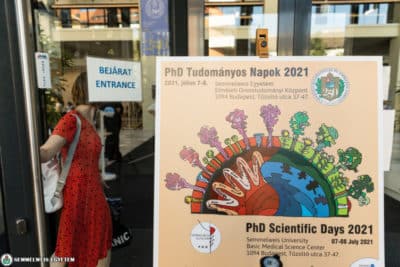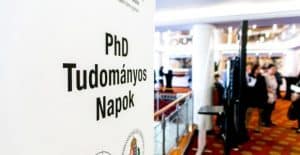151 PhD students from seven Doctoral Schools introduced their latest research and clinical results in eight presentation- and seven poster sections at one of Semmelweis University’s scientific programmes in the spring, the PhD Scientific Days.
 The conference has been organised every year by the Doctoral School since 1999 and this year’s event was opened by Dr. György Bagdy, Vice-Rector for Scientific Affairs. The conference gives an outstanding opportunity to PhD students to get feedback from professionals and have discussions with experts.
The conference has been organised every year by the Doctoral School since 1999 and this year’s event was opened by Dr. György Bagdy, Vice-Rector for Scientific Affairs. The conference gives an outstanding opportunity to PhD students to get feedback from professionals and have discussions with experts.
“The most important criterion of scientific research results is their reproducibility, therefore quality should be favoured instead of quantity in the course of research activities. As John P. Ioannidis, professor of Stanford University said in one of his papers, 85 percent of clinical and preclinical research activities are useless in terms of their reproducibility.” Dr. György Bagdy said.
 In his speech Dr. József Tímár, President of the Doctoral School spoke about the changes happening in postgradual education.
In his speech Dr. József Tímár, President of the Doctoral School spoke about the changes happening in postgradual education.
“There has been a great demand for predoctoral scholarships especially from those participating in the three-year-long doctoral programme. Thus, the Doctoral Council will favour predoctoral scholarships in the framework of the National Excellence Programme.”, Dr. József Tímár announced.
In addition, a successful grant application will enable the improvement of PhD education at the university, which requires a 20 percent increase in PhD graduates in the following five years. This poses a considerable challenge for the Doctoral School as Semmelweis University has 100-110 PhD graduates every year, therefore to fulfill the requirements of the application 20 more graduations would be necessary. On the other hand, the Doctoral School would receive a fund which is several times more than its budget.
“In order to increase the number of PhD degrees, the MD-PhD programme will be revived, which is the inclusion of the most outstanding students of the Students’ Scientific Association in the PhD programme. We would also like to create a stronger link between resident training and the PhD programme.”, Dr. József Tímár said.
 Traditionally, awardees of the outstanding PhD educator title hold presentations at the PhD Scientific Days. This year, the first lecture after the opening ceremony was held by Dr. Barna Vásárhelyi, Director of the Department of Laboratory Medicine on the results of his research of 15 years. The research focused on the various processes in the body of premature babies and the possible causes of the evolution of adverse effects. In the afternoon section of the first day the presentation of Dr. András Kiss, Deputy Director of the 2nd Department of Pathology introduced the research on the role of micro-RNA in the patomechanisms of tumours. The second day was opened by the lecture of another outstanding PhD educator, Dr. Béla Merkely, Director of the Városmajor Heart and Vascular Centre on the resynchronisation therapy of heart failure. The presentation of Dr. Atilla Patócs, Deputy Director of the Department of Laboratory Medicine was titled “Endocrinology Research at the 2nd Department of Internal Medicine” and was an homage to the late Dr. Károly Rácz. It revealed how the late President of the Docotral Council lead the Department’s research group to become Hungary’s leading endocrinology centre.
Traditionally, awardees of the outstanding PhD educator title hold presentations at the PhD Scientific Days. This year, the first lecture after the opening ceremony was held by Dr. Barna Vásárhelyi, Director of the Department of Laboratory Medicine on the results of his research of 15 years. The research focused on the various processes in the body of premature babies and the possible causes of the evolution of adverse effects. In the afternoon section of the first day the presentation of Dr. András Kiss, Deputy Director of the 2nd Department of Pathology introduced the research on the role of micro-RNA in the patomechanisms of tumours. The second day was opened by the lecture of another outstanding PhD educator, Dr. Béla Merkely, Director of the Városmajor Heart and Vascular Centre on the resynchronisation therapy of heart failure. The presentation of Dr. Atilla Patócs, Deputy Director of the Department of Laboratory Medicine was titled “Endocrinology Research at the 2nd Department of Internal Medicine” and was an homage to the late Dr. Károly Rácz. It revealed how the late President of the Docotral Council lead the Department’s research group to become Hungary’s leading endocrinology centre.
The list of award winner presenters may be downloaded here.
Eszter Keresztes
Photo: Attila Kovács – Semmelweis University
Translation: Ágnes Raubinek


